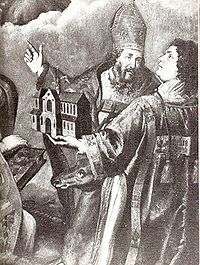Badurad

Badurad (* probably before 785; † September 17, 862 in Paderborn ) was the second bishop of Paderborn (815-862).
Badurad, presumably from either the Immedinger or Mattonen aristocratic family (who would then have been largely related to Charlemagne ), was held hostage during the Saxon Wars (772-804) and trained as a cleric in Würzburg . Only with the beginning of his pontificate, which was dedicated to the stabilization and expansion of the still young Paderborn diocese, is it better understood in the sources. Badurad supported u. a. the founding of the monasteries Corvey (815/822) and Herford (832) as well as the canon monastery Böddeken (836/840). The most significant event of his tenure was the well-documented transfer of the Liborius relics in 836 from Le Mans to Paderborn, which established a prayer fraternity between the two cathedral chapters. To accommodate the relics of St. Liborius, who later became the Paderborn diocese patron, Badurad had the cathedral extended by a west transept with a crypt .
Outside the diocese, Badurad can be found in 829, 847 and 852 as a participant in synods in Mainz , 840 in Ingelheim and between 833 and 838 several times in the vicinity of Emperor Ludwig the Pious . For a short time he acted as royal messenger , negotiated the reconciliation with Lothar I as one of three legates of the emperor in 834 and was one of the three spiritual judges in the deposition process against Archbishop Ebo of Reims in 835 . Through these activities Badurad came into close contact with the leading imperial episcopate, which he joined by participating in various relic translations . There is evidence that Badurad also attended the imperial assemblies in 836 in Diedenhofen and in 838 in Nijmegen .
When the Carolingian Empire collapsed between 840 and 843, Badurad initially sided with Lothar I and the defeated Reich Unity Party. Only very gradually did he come to terms with King Ludwig II. , Known as the German , to whose Eastern Franconia the Diocese of Paderborn had undoubtedly been since 843 and whose bishopric Ludwig the German visited in 840 and again in 845. Badurad's loyalty always seems to have been to the legitimate ruler, but never to a usurper.
Badurad died on September 17, 862 and was probably buried in Paderborn Cathedral. He has been venerated as a saint since the end of the 9th century.
literature
- Hans-Jürgen Brandt, Karl Hengst : The bishops and archbishops of Paderborn . Bonifatius-Verlag, Paderborn 1984, ISBN 3-87088-381-2 , pp. 42-47.
- Klemens Honselmann: Badurad. In: New German Biography (NDB). Volume 1, Duncker & Humblot, Berlin 1953, ISBN 3-428-00182-6 , p. 514 ( digitized version ).
- Sascha Käuper: Bishop Badurad of Paderborn (815–862) . In: Lutz Fenske u. a. (Ed.): Splendor palatii. New research on Paderborn and other palaces of the Carolingian era (German royal palaces; vol. 5). Vandenhoeck & Ruprecht, Göttingen 2001, ISBN 3-525-35311-1 , pp. 123-154.
- Hedwig Röckelein : Reliquary translations to Saxony in the 9th century. About communication, mobility and the public in the early Middle Ages . Thorbecke, Stuttgart 2002, ISBN 3-7995-7442-5 (plus habilitation thesis, Univ. Hamburg 1998).
Web links
| predecessor | Office | successor |
|---|---|---|
| Hathumar |
Bishop of Paderborn 815–862 |
Luithard |
| personal data | |
|---|---|
| SURNAME | Badurad |
| BRIEF DESCRIPTION | second bishop of Paderborn |
| DATE OF BIRTH | before 785 |
| DATE OF DEATH | 17th September 862 |
| Place of death | Paderborn |